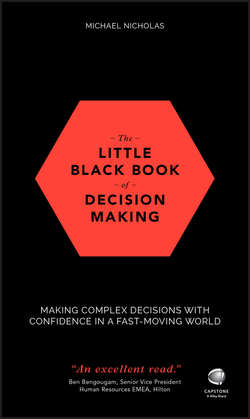Читать книгу The Little Black Book of Decision Making - Nicholas Michael - Страница 10
На сайте Литреса книга снята с продажи.
Part One
No Place for Old Dogs: New Tricks Required
1
Let's Get Real: We All Make Mistakes
The Problem with Hindsight
ОглавлениеIn examining the events leading up to the Challenger accident, it would be completely understandable to have the urge to scratch your head and wonder how so many obviously intelligent people (we are talking about rocket science, after all) could have displayed such apparent ineptitude. How did NASA, an organisation that places such importance on safety, end up so flagrantly violating its own rules and appear to have so little regard for human life?
“Our comforting conviction that the world makes sense rests on a secure foundation: our almost unlimited ability to ignore our ignorance.”
– Daniel Kahneman, Nobel Prize-winning Professor of Psychology and international best-selling author on judgment and decision making
When a decision has gone badly, the benefit of hindsight often makes the correct decision look as though it should have been blindingly obvious. But once you are aware of this bias, you'll see it everywhere – from the immediate aftermath of the horrendous terrorist atrocities in Paris in November 2015, where the press began questioning how intelligence services had failed to anticipate the attacks as soon as the “facts” leading up to them began to emerge, to football supporters who believe they have far greater expertise at picking the team than the manager, to the times when we second-guess our own decisions: “I should have known not to take that job”, “I knew the housing market would collapse/go up”, “I should have known that he was being unfaithful to me”, “I knew that if I trusted her she'd hurt me”, “I should have listened to my intuition”, and on it goes …
This “hindsight bias” refers to the tendency for uncertain outcomes to seem more likely once we know the outcome that has occurred. Because of it, we are prone to view what has already happened as relatively inevitable and obvious, not realising how the information about the outcome has affected us.
One of the first psychologists to investigate hindsight bias was Baruch Fischoff who, together with Ruth Beyth, used President Richard Nixon's historically important 1972 diplomatic visits to China and Russia as the focus for a study. Before the visits took place, participants were asked to assign probabilities to 15 possible outcomes, such as whether the U.S. would establish a diplomatic mission in Peking or establish a joint space programme with Russia. Two weeks to six months after the visits had taken place, the same people were asked to recall what their earlier predictions had been. The results were clear. The majority of participants inflated their estimates for the outcomes that had occurred while remembering having assigned lower probabilities to those that had not. This bias also became stronger as the time between the initial prediction and the recall task increased. Many other events that captured public attention have since been studied, with similar results.
The heart of the problem seems to be that once we adopt a new understanding of the world, we immediately find it difficult to reconstruct past beliefs with any accuracy. This inevitably causes us to underestimate our own level of surprise at past events and, on the flip side of the coin, explains why it is so easy to be surprised when others overlook the obvious, as NASA did in the run-up to the Challenger accident.
Hindsight, because it is always 20:20, ensures that we feel on safe ground when criticising others’ irrationality or lack of foresight; moreover, it simultaneously reduces our ability to evaluate past decisions objectively (our own or those of others). It can have an extremely detrimental impact on both decision making and decision makers:
• Decisions that don't work out can often be punished, because the variety of factors that were outside the control of the decision maker are difficult to recognise after the event.
• If decision makers come to expect that their decisions will be scrutinised with hindsight, they are much more likely to seek risk-averse and bureaucratic solutions.
• Irresponsible risk seekers can be undeservedly rewarded when their decisions work out because it is hard to recognise their gamble, so they don't get punished for taking too much risk. Meanwhile, anyone who doubted them may get branded as conventional, over-cautious, or plain weak.
• Perhaps most importantly, hindsight severely reduces our ability to learn from past decisions. We'll look at why this is so important in the next couple of chapters.
We are all susceptible to hindsight bias, but it can be very difficult to recognise what is happening.
